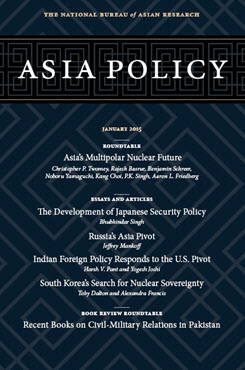The Development of Japanese Security Policy
A Long-Term Defensive Strategy
This essay examines the developments in Japanese security policy that have been undertaken by the Abe government since December 2012.
EXECUTIVE SUMMARY
MAIN ARGUMENT
Challenging the dominant negative analyses of Japanese security policy under Shinzo Abe, particularly from China and South Korea, the essay makes two key points. First, the security policy developments are not specific to Abe’s administration but instead are part of a long-term trajectory that started at the onset of the post–Cold War period. Second, Japan’s emergence as an active security actor is a source of regional stability, as the measures the country has implemented are arguably a defensive response to the rising instability in Northeast Asia. Japan’s democratic identity, the resilient pacifism within Japanese society, and the continued robustness of the U.S.-Japan alliance support this conclusion.
POLICY IMPLICATIONS
- Japan’s long-term trajectory to widen its security policy in the post–Cold War period is best understood beyond the notion of remilitarization. While the escalating tensions in Northeast Asia have motivated Japan to expand its security policy, this process is limited by a range of domestic factors that ensure it pursues a defensive policy.
- It is important for Tokyo to recognize that any development in its security policy inevitably raises concerns among its neighbors. For Japan to be accepted as a responsible actor in security affairs, the leadership must refrain from behavior that escalates bilateral tensions as a result of Japan’s unresolved historical legacies.
- Defense diplomacy is an important way for Japan to engage with its immediate neighbors, namely China and South Korea. Greater interaction between the defense establishments of these three countries at the bilateral, trilateral, and multilateral levels will help build trust in the region.
About Asia Policy
Asia Policy is a peer-reviewed scholarly journal presenting policy-relevant academic research on the Asia-Pacific that draws clear and concise conclusions useful to today’s policymakers. Asia Policy is published quarterly in January, April, July, and October and accepts submissions on a rolling basis. Learn more


